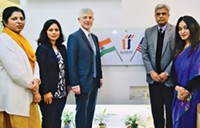Advertisement
Grab your lab coat. Let's get started
Welcome!
Welcome!
Create an account below to get 6 C&EN articles per month, receive newsletters and more - all free.
It seems this is your first time logging in online. Please enter the following information to continue.
As an ACS member you automatically get access to this site. All we need is few more details to create your reading experience.
Not you? Sign in with a different account.
Not you? Sign in with a different account.
ERROR 1
ERROR 1
ERROR 2
ERROR 2
ERROR 2
ERROR 2
ERROR 2
Password and Confirm password must match.
If you have an ACS member number, please enter it here so we can link this account to your membership. (optional)
ERROR 2
ACS values your privacy. By submitting your information, you are gaining access to C&EN and subscribing to our weekly newsletter. We use the information you provide to make your reading experience better, and we will never sell your data to third party members.
Biological Chemistry
Science Academy Presidents Meet
by Stu Borman
January 5, 2009
| A version of this story appeared in
Volume 87, Issue 1

Taiwan's Academia Sinica celebrated its 80th anniversary in 2008, and in honor of the occasion, President Chi-Huey Wong invited presidents of other national academies of science to meet in Taipei at an Academy Presidents' Forum. At the meeting, held in early December, national academy presidents from 14 countries and a number of other participants discussed such questions as how modern science academies can be structured to optimize knowledge-based development in their respective countries and how the scientific community can best contribute to solutions to environmental problems.
Physical chemist Yuan-Tseh Lee, president emeritus of Academia Sinica, helped organize the forum. Taiwan President Ying-jeou Ma addressed attendees in an opening session, at which he reiterated his strong support for scientific research in Taiwan. U.S. participants at the forum included Ralph J. Cicerone, president of the U.S. National Academy of Sciences, and Steven Chu, director of Lawrence Berkeley National Laboratory and President-Elect Barack Obama's nominee for Secretary of Energy (C&EN, Dec. 15, page 6).
As the sessions concluded, Academia Sinica Vice President Chao-Han Liu summarized the proceedings for attendees, noting the general agreement that national academies of science have plenty of pressing challenges to take on. These include helping to find ways to reduce CO2 emissions and minimize global climate change, preserving the biodiversity of life on Earth, and solving problems in the arenas of energy supply and demand.
Liu said that "academies should play the role of a moral force"—for example, by promoting more inclusive societies for citizens of their countries and helping to find new models for drug trials, "especially for drugs that are important to poor people in poor societies." Academies should also nurture exchanges between researchers in the sciences, social sciences, and humanities to solve problems of an interdisciplinary nature, he noted.
"I think we all agree that closer and more frequent international cooperation and communication among academies is essential for our efforts to solve the problems facing our societies today," Liu told the forum.
- A Science Academy Like No Other
- Taiwan's Academia Sinica addresses challenges in an effort to attract best students, faculty
- Policy Forum
- Science Academy Presidents Meet




Join the conversation
Contact the reporter
Submit a Letter to the Editor for publication
Engage with us on Twitter